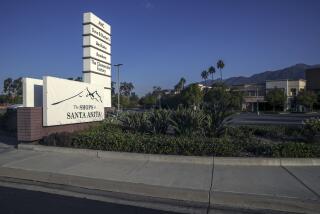Deal Reflects Japanese Push Into Hotels
- Share via
The Biltmore Hotel will become the newest entry on a list of some of the world’s best-known hotel and leisure properties that are now owned by Japanese investors.
The purchases are part of the massive flow of Japanese investments that have poured into the United States and other foreign countries over the last three years. Since the Japanese have exhausted most of the prestige “trophy” office buildings available for purchase, they have diversified into other types of properties, such as hotels.
But the interest in leisure properties reflects another strategy as well: To capture and recycle some of the money spent abroad by the ubiquitous Japanese tourists, of whom a record 8.5 million are expected to travel to foreign countries this year.
“The Japanese investment dollar is looking to diversify geographically and by product type globally,” explained Jack Barthell, a managing partner at the real estate consulting firm of Kenneth Leventhal & Co. in Century City.
Fifteen years ago, Japanese investments in leisure properties were mostly confined by choice along the blue shores of Waikiki. Today, they span the world from Australia to China to Brazil and Great Britain.
The list reads like a Who’s Who of a five-star travel guide: Hotel Bel Air in Beverly Hills, the Inter-Continental Hotel chain, the Algonquin in New York, Moana in Honolulu, Riviera Country Club in Pacific Palisades, Dana Point Resort in Laguna Niguel and La Costa Resort & Spa.
Purchases of U.S. hotels and other leisure properties accounted for about 22% of the record $16.5 billion Japanese interests invested in all U.S. real estate in 1988, according to Kenneth Leventhal. “We expect the dollar amount and percentage of the total will significantly increase from 1988 levels,” Barthell said.
Japan’s move into a more consumer-oriented economy is encouraging more leisure time. Travel ties in to hotel, resorts, golf courses and other leisure activities. “It’s like ANA (All Nippon Airways) having hotels and flights in cities, a kind of vertical integration,” said Barthell.
That in turn helps from a merchandising standpoint. “It’s not unlike United Airlines a few years ago when it bought Hertz and Hilton Hotels . . . it’s good business,” he added. (United’s parent company has subsequently divested itself of those properties.)
“The tourist factor can’t be exaggerated,” said Christopher Mead, editor of the monthly newsletter, Japanese Investment in U.S. Real Estate Review. “Southern California is a major destination for Japanese tourists.”
Destinations and places with well-known and prestigious names are a big lure. “The Japanese focus on prestige properties,” added Mead. “Japanese like to focus on prestige items whether it’s hand luggage or suits or foreign guests, like President Reagan. They are willing to pay top dollar for recognizable names. The prestige value goes beyond (the tourist), they can list a property in the corporate brochure of the parent company, it helps to enhance or add prestige.”
Barthell said Japanese investors also like hotels because “they are operating businesses, not just real estate plays. They can be operated effectively and more profitably if money is spent on physical appearance and upkeep in the level of service. Also hotels are perceived in this country to be overbuilt and risky investments. They are overbuilt and risky but we’re not seeing more hotels coming on line, so those that exist can do better.”
More to Read
Inside the business of entertainment
The Wide Shot brings you news, analysis and insights on everything from streaming wars to production — and what it all means for the future.
You may occasionally receive promotional content from the Los Angeles Times.










